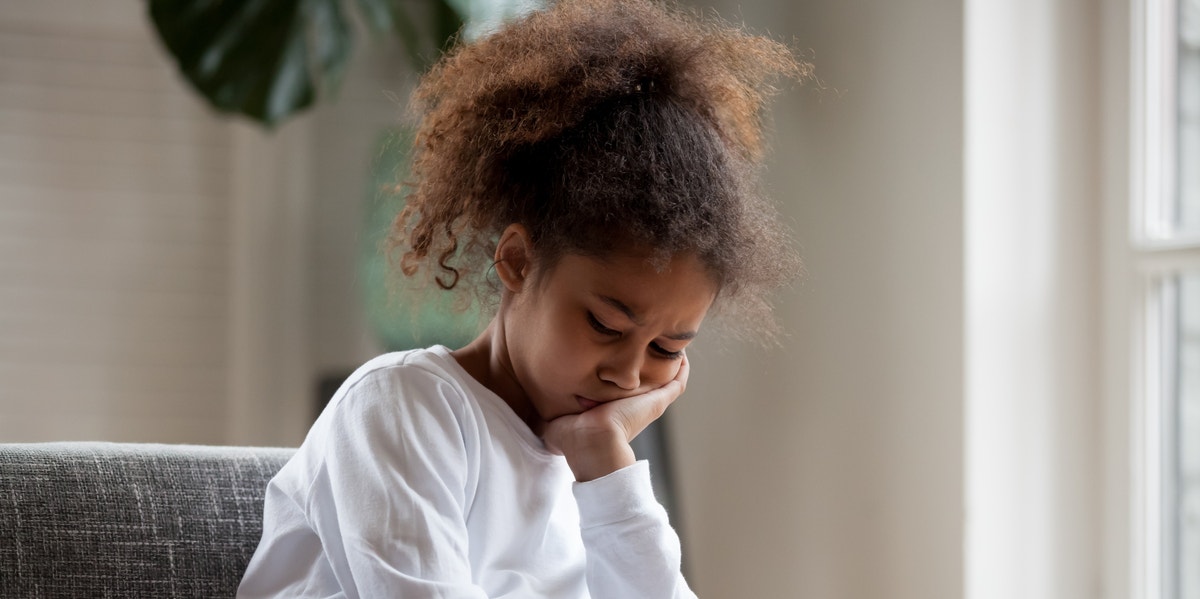Black Children Are Dying By Suicide. I Know How They Feel.
I had my first suicidal ideation at 11.
 fizkes / Shutterstock
fizkes / Shutterstock CW: mental health, suicide, children
“For your safety, always stand behind the yellow line…”
I read these words as I sat on the rugged wooden subway bench, 12 or so dirty tiled feet from the line, a yellow line pocked with bubbles as a warning to your feet that you are getting too close. I reread the sign. “For your safety…” Safe?
I didn’t feel safe. At the time, I don’t know when I ever felt safe.
I was physically safe. I was not concerned about being attacked or being physically harmed by others. I’d been using Philadelphia public transit — Septa — since I was a toddler. At 11 years old, I wasn’t afraid of the world.
I was afraid of me.
While people stood all around, an invisible hand grabbed my heart and tried to pull me over that line. Coaxing me to feel my body on the edge as the wind precedes the train as it comes from the tunnel.
It took all my strength not to succumb. I imagined being weighed down by a giant rock on my lap and strapped to the wall.
This is my earliest memory of a round of depression that would become a feature of my self-concept for the next thirty years. It’s my first memory of the strong desire to no longer be here.
***
“Why Are More Black Children Dying by Suicide?” “Suicide Rates Rise in a Generation of Black Youth.” “Addressing the Crisis of Black Youth Suicide.” “Sounding the alarm on black youth suicide.” “Black kids and suicide: Why are rates so high, and so ignored?”
As these headlines starkly proclaim, Black children are in crisis.
In the last thirty years, the suicide rate has grown for Black children while falling for all other racial and ethnic groups. The reasons are not well known but there are many likely candidates. Black children tend to experience more trauma during childhood than their non-Black peers, experiences that change their brains.
The trauma associated with racial subordination in health care, social services, police violence, and general structural violence wreaks havoc on the psyches of the littlest and most vulnerable of us.
Unfortunately, we don’t know enough about why mental health challenges are affecting Black children because it’s not a well-developed field of knowledge beyond reporting statistics (although over the last few years, that literature is growing.)
***
At school, I was called a crybaby.
At home, I was told to stop crying or…
In the world, I learned that I was a Black Woman who must carry the weight of the world on my back and do so without complaint.
But I was a child suffering and needed help.
To my friends and family, my emotions and responses to those emotions were evidence of weakness.
To me, my emotions were outside of my body, raw, and so very painful. Every feeling was like a slap to my literal heart, making it skip a beat. I could only escape these slaps by making myself as small and inoffensive as possible, keeping my feelings to myself, those shameful feelings. I, a little Black girl, was not allowed to feel.
Behind every Black child’s suicide is an attempt. Behind every attempt are suicidal ideations. Behind every suicidal ideation are dysregulated thoughts and emotions and behaviors. And at a time in their lives when children’s thoughts and feelings and behaviors are already shifting and changing in scary ways, children battling mental anguish are doubly impacted.
***
Since I was 11, I’ve sat on that bench countless times and stared at that bumpy yellow line, read the warning sign. Whether in subways in Philly or New York, Oakland or San Francisco — for the last 30 years, I’ve battled that hand trying to pull me over the line, coaxing me to feel the wind on my face and imagine the end of the pain. And every time, I held onto that rock, praying for my life.
After years of therapy, two diagnoses, ten medications, six or seven ER visits, one inpatient treatment, four intensive outpatient treatments, and chronic pain, I’m still, at 41 years old, that little Black girl who feels and needs help.
I get that help now. Thirty years later, I now understand that my depression is episodic, and I have a lot of tools to cope. Even in the pit, I know that if I hang on, it will get better.
Yes, every single time, it’s gotten better.
I do hope those scary headlines are indeed sounding the alarm, and I pray that those warnings are heeded by those who can help.
At the same time, I am not terribly optimistic. My experience is a gamble for which I have been extremely lucky. Every time in the last 30 years in the craps game that is my life, I have rolled a seven. Our children do not have that kind of time. And Black children typically don’t have that kind of luck.
LaToya Baldwin Clark is a professor, education and mental health advocate, and essayist, who writes about the law of educational inequality, property, and the family.

